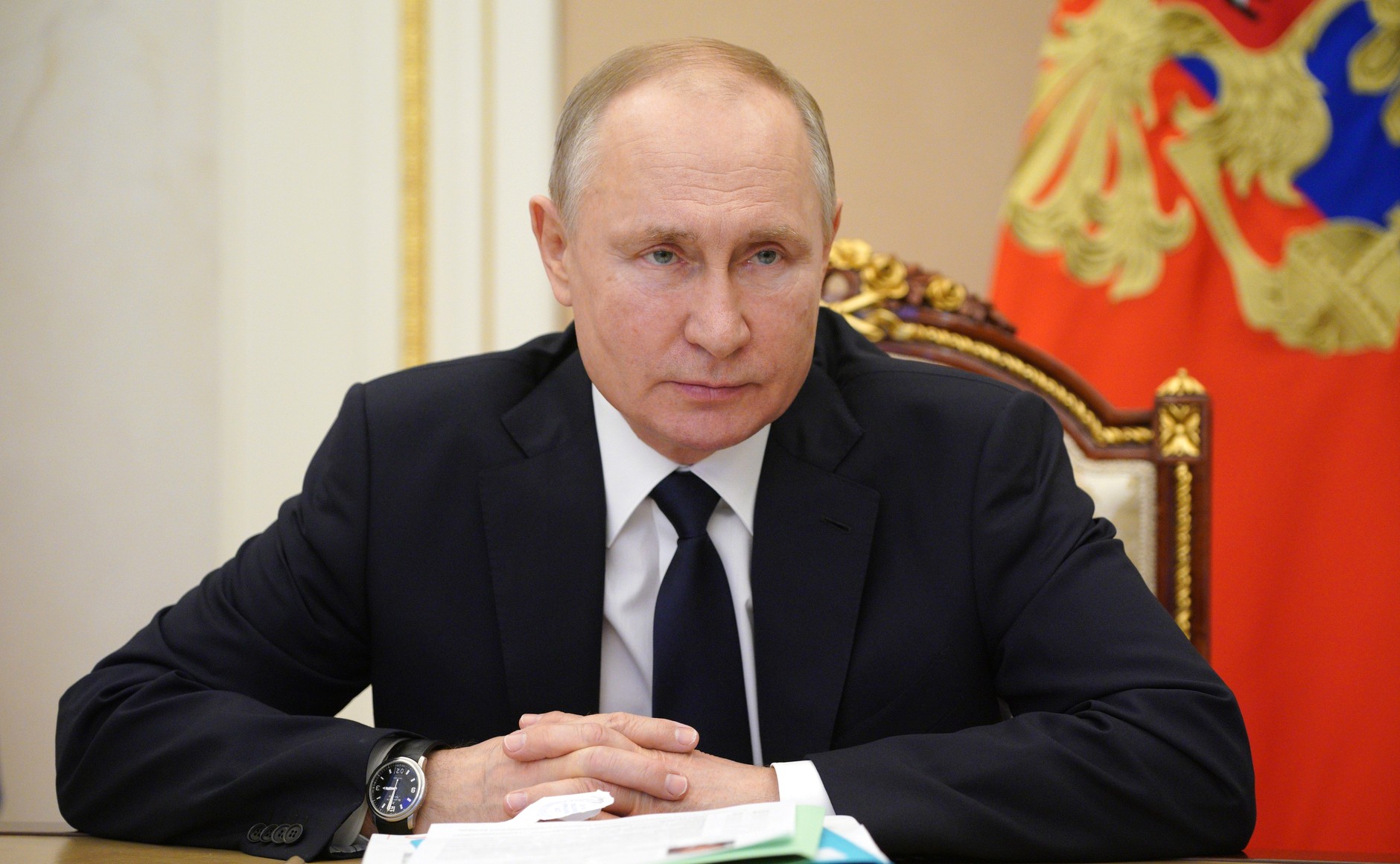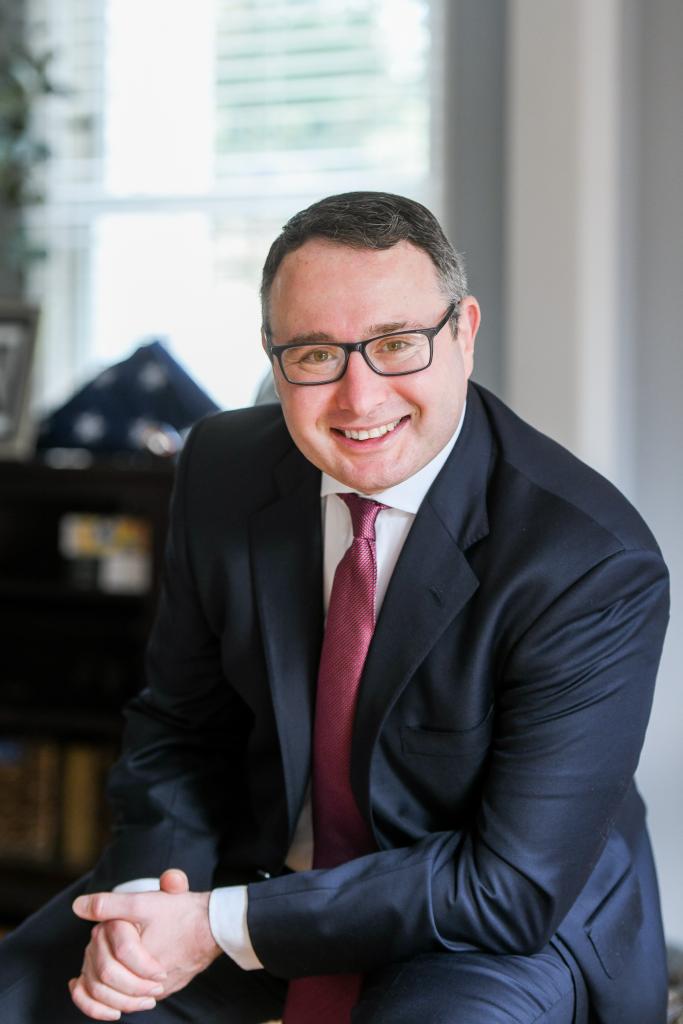It Is Time to Stop Looking for a Reset With Russia
Common interests and shared values are necessary for durable bilateral relations—and the United States shares neither with Russia.

Published by The Lawfare Institute
in Cooperation With

On April 15, President Biden issued an executive order authorizing sweeping new sanctions against Russia in response to Russian interference in the 2020 U.S. presidential election and the SolarWinds hack. These new designations include sovereign debt prohibitions, as well as sanctions on companies and individuals connected to the Russian intelligence services and cyber activities, Russian illicit financial networks, Russian disinformation outlets and Russians involved in the occupation of Crimea. These measures signify the start of a tougher U.S. policy on Putinism, especially alongside the $125 million in Ukraine Security Assistance Initiative funds that the Department of Defense approved earlier this year.
As Biden himself noted, his administration’s push could have gone further—and it probably should have. Biden chose to prioritize deescalation. He opted for the most limited prohibitions on Russia’s sovereign debt, and some experts have already pointed out that U.S. organizations can still buy Russian debt on the secondary market. The additional sanctions also left Putin’s circle of oligarchs and their families unscathed.
But whatever the shortcomings of the Biden administration’s actions, its approach so far suggests that Biden is not looking for a comprehensive reset in relations with Russia. This is a clear, and welcome, departure from Biden’s predecessors. President George W. Bush found Putin to be “straightforward and trustworthy” after looking “the man in the eye” and getting “a sense of his soul”—sentiments that have proved unfounded. President Obama pursued a “reset” that ended in failure. And President Trump led a listless diplomatic agenda that resulted primarily in American disengagement from international institutions and acquiescence to Russian interests. In contrast, Biden—who, like Bush, reportedly once stared into Putin’s eyes but, unlike Bush, told him he had no soul—appears to be taking a different approach.
Biden seems to recognize that common interests and shared values are necessary for durable bilateral relations—and that the United States shares neither with Russia.
Yet some U.S. allies are still struggling to abandon the temptation of a Russia reset. In February 2021, High Representative of the E.U. Josep Borrell traveled to Moscow in the latest effort by a Western leader to reset relations with Russia. Previous resets have lasted a few years. Less successful efforts have lasted months. This effort lasted mere hours. During his short visit, Borrell was so humiliated by his Russian counterparts that it imperiled his brief tenure as high representative. Following this failure, Carl Bildt, former prime minister of Sweden and a fixture of the European foreign policy establishment, criticized the reset efforts as futile and even counterproductive so long as the Kremlin refuses to reset its own policies.
Although there is work left to be done, Biden has spearheaded an important change from futile resets. Other Western leaders must follow his lead and recognize that irreconcilable differences with Russia will not go away in the foreseeable future—they come from domestic policy positions that are endemic to the Putinist regime.
These irreconcilable differences stem from a variety of stances taken by the regime. Andrew Radin and Clint Reach’s 2017 Rand report, “Russian Views of the International Order,” highlights several key areas where these differences are located: defense of the regime, noninterference in domestic affairs, great power hegemony over the near-abroad and Russia’s desire to preserve its geopolitical power. Based on the Kremlin’s current policies in these spheres, any hopes of a reset remain a fantasy.
In terms of national defense, the Putinist regime frames Western liberal values and democracy as an existential threat. The Kremlin understands that democracies along its border will invariably assert their sovereignty and advance their national interests. To combat this possibility, the Russian government portrays democracy as an inherently chaotic and unstable enterprise. If these democracies were to flourish, however, this would undercut the Kremlin’s narrative. This would endanger the regime’s carefully constructed image of resurgent Russian power guided by the stable hand of authoritarianism. So, the Kremlin is incentivized to oppose the expansion and development of democracies.
The Putinist regime also wants Russian hegemony to be unchallenged in Eurasia. The Kremlin amplifies foreign threats to both a domestic audience and the near-abroad to support this goal. For instance, the regime claims that the West perpetually interferes in Russia’s domestic affairs and in the near-abroad. This disinformation is designed primarily to distract Russians’ attention from the domestic determinants of discontent: rampant corruption, failure to satisfy basic needs, declining standards of living and overreach of the security services. Since the Kremlin perennially refuses to address these systemic issues, it needs to fuel conspiracy theories to keep its constituents’ attention focused outward, rather than inward. By that logic, any resistance to the government is characterized as a foreign threat. In one of the most recent manifestations of this trend, the Russian government is attempting to ban Alexei Navalny’s Anti-Corruption Foundation and campaign offices. The regime is labeling these organizations as “extremist” for their alleged role in plotting to stage “color revolutions,” while supposedly operating on behalf of foreign entities. And in another example, on April 17, Russian intelligence claimed—without any evidence—that Belarusian dictator Alexander Lukashenka was the target of a U.S.-backed coup and assassination plot. In light of ongoing domestic issues, this vilification of Western influence and the West’s principled approach to accepting sovereign states that aspire to join the Western liberal order is unlikely to subside.
With this government-induced focus on foreign affairs, many Russians still cling to notions of Russian great power and exceptionalism drawn from the legacy of the czarist empire and the Soviet Union. These notions translate into their attitudes toward the near-abroad. According to survey data from the Levada Center—an independent, nongovernmental polling and sociological research institution in Russia—more than 80 percent of Russians consistently express support for the annexation of Crimea, while less than 10 percent of Russians support the unconditional return of the separatist-controlled Donbas to Ukraine. Putin exacerbates this issue with an ongoing irredentist agenda. His worldview dictates that only great powers are sovereign, while smaller states belong to privileged spheres of influence. Putin has even declared that some of Russia’s neighbors are not real states. As such, the Putinist regime advances a central strategic objective of regional supremacy in a multipolar world.
In Putin’s mind, a Russian Eurasia pole necessitates, at minimum, control over neighbors’ foreign policy, incorporation into the Eurasian Economic Union, and inclusion in the Collective Treaty Security Organization. But Putin’s ambitions have come crashing down thanks to an overinflated sense of his own strategic abilities. During the annexation of Crimea and the failed Novorossiya project—wherein Putin sought to absorb the southeastern half of Ukraine into the Russian Federation—Ukrainian loyalties were not cleanly split along ethno-linguistic lines. Instead, the existence of a pro-Russian East turned out to be a myth. As a result, the Kremlin failed to establish the so-called Russian World (Russkiy Mir), Putin’s alternative to the Western liberal order that, according to political scientist Taras Kuzio, encompasses populations supposedly bound by a shared language, religion, culture, history and worldview. Nevertheless, there is little doubt of Putin’s continued desire to bring Ukraine and other former Soviet states under Russian control. The U.S. and its European allies have professed commitments to supporting democracy in these countries, so this remains an explosive point of policy divergence.
To compensate for the stillborn Russian World, Putin has shaped Russia into an inveterate spoiler to retain geopolitical prestige and influence. Russia’s economic malaise and waning power require an asymmetric approach that employs military aggression, vast illicit finance and criminal networks, and interference in foreign elections. The resulting discord and instability abroad bolster the regime’s image as a foil to caricatures of democracy. These actions are born out of Putin’s view of geopolitics as a zero-sum game. Since Russia is incapable of “winning” in its current state, others—namely the West—must “lose.”
These issues do not just result from Putin’s personal worldview. The Russian elites who benefit from his authoritarian, crony capitalist system also share his vision. To move away from this worldview and prosper, Russia would need to undergo a painful transformation; the elites who currently preside over Russia’s corrupt institutions would need to drastically change their outlook. In 2018, historian Stephen Kotkin used the German term Vergangenheitsbewältigung—“coming to terms with the past”—to describe the fundamental shift required to undertake internal policy restructuring within Russia. Noting that few countries have managed this transition without major conflict, Kotkin presented the U.K. and France as exemplars: In both countries, transition was eased by the recognition that power would reside in the Western liberal order and the pluralistic notion that all members of the Euro-Atlantic alliance could mutually benefit and prosper. In Russia’s case, though, irreconcilable differences preclude this transition.
Putin’s policies may be a reaction to his grasp of the limited time Russia has to arrest its relative decline, but his only solution to this problem has been to expend resources on foreign engagements while ignoring deep-rooted internal problems. In doing so, he perpetuates the conditions that demand reform. Any short-term reprieve that might result from this approach is quickly replaced by further domestic decline, thereby looping back to Putin’s policy prescriptions. This cycle effectively ensures that Russia’s current leadership will remain both unwilling and unable to pursue a reset in relations with the West.
The real reset needs to happen in the hopes and expectations of U.S. and EU policymakers. The Obama administration’s Russian reset created a well-intentioned, but ill-fated, model for every subsequent reset. Despite the initial successes born out of increased engagement, the Obama reset failed insofar as it dealt with a fundamentally authoritarian regime that had not changed its underlying illiberal, chauvinistic, and jingoistic motivations and structures of power since the 2008 invasion of Georgia. This became evident after a collection of concerning developments: the Kremlin’s early support and then negative reaction to the NATO-led intervention in Libya, Putin’s unsurprising return to the presidency in 2012, and Russia’s hybrid warfare invasion of Ukraine.
But there should have been no mystery about Putin’s intentions after the 2007 Munich Security Conference—where Putin outlined his vision of a multipolar world, condemned the expansion of NATO and expressed his paranoia over the near-abroad. Even prior to that point, Russian dissidents, such as Boris Nemtsov and Vladimir Kara-Murza, had warned about the threat of Putinism and the increasing likelihood that the regime would change the constitution, abolish democratic freedoms and establish a full-scale dictatorship. The U.S. and EU failed to heed the warning signs as successive groups of policymakers convinced themselves of the possibility of rapprochement.
It is well past time to accept that a reset cannot happen with Putin and his devotees at the helm of the Russian Federation. Leaders should limit official engagement with Russia to areas of mutual interest, such as climate change, arms control and military deconfliction. Simultaneously, the U.S. and EU must restore and proliferate contact with Russian civil society to preserve links for an eventual post-Putin Russia. The Euro-Atlantic alliance must also rely on continued pressure to deter Russian malign influence and military aggression. Operating from an uncompromising position of strength signals to Russian domestic audiences that Russia must seek alternatives to its current adversarial paradigm.
The recent Russian military buildup near Ukraine’s border and in occupied territories underscores the need for a bulwark against provocations. According to Borrell, Russian forces have swelled to more than 150,000 troops. At minimum, these actions by Russia are saber-rattling aimed at intimidation. At worst, they could be the first stages of a renewed conflict, one that Russian Foreign Minister Sergei Lavrov has already threatened could destroy Ukraine. The Kremlin has been quick to preemptively blame this scenario on Ukraine, the U.S., the West, and NATO—yet another sign that Russia desires complete disengagement and acquiescence to Russian hegemony as a prerequisite to harmonious relations.
The Kremlin will perceive any pushback from the West as an escalation or a provocation. Recent Western sanctions have already earned the enmity of the Russian government. Putin does not share the view that sanctions are part of a proportionate response. The Kremlin has retaliated against every Western reaction to Russian malign influence. After the U.S. and Poland expelled 10 and three Russian diplomats, respectively, on April 15, Russia expelled 10 American and three Polish diplomats the next day. On Saturday, the Czech Republic started a manhunt for Alexander Petrov and Ruslan Boshirov, the primary suspects in the 2018 poisoning of Sergei Skripal and his daughter. The Czech Republic also expelled 18 Russian diplomats over their connections to Russian intelligence services and a 2014 explosion at an ammunition depot. By Sunday, Russia responded with the expulsion of 20 Czech diplomats. Despite these dueling exchanges, the Biden administration and Western leaders must not shrink from the task set out before them. Borrell already failed on this count with his announcement today that the EU is not planning or preparing any new sanctions. Sacrificing deterrence for a fleeting hope at deescalation is foolhardy.
Biden’s desire for deescalation is warranted, but the sense of risk is misplaced. Russia sees as much if not more risk in bilateralizing the conflict, but leverages saber-rattling to get the U.S. and European countries to self-deter. It would be a mistake to let the Kremlin perceive Western actions as a lack of resolve to defend Euro-Atlantic interests. If deterrence continues to fail, the long-term risks of a more serious confrontation will compound. Eventually, Russia will cross a threshold and meet a resolute response.
Tensions with Russia are not set to immediately ease up. To avoid the worst-case scenario, the West must deter any extreme Russian actions. French President Emmanuel Macron acknowledged on Saturday that the West has taken a “naive approach” with Russia and needs to “define red lines.” These red lines cannot resemble the Obama administration’s chemical weapons “red line” in Syria. Real deterrence starts by clearly articulating meaningful consequences for issues ranging from Navalny’s potential murder in prison to Russian activities in the Sea of Azov and any further violations of Ukrainian territorial integrity. There are plenty of potential targets to impose consequences on the regime. The hydrocarbon and mineral industries that fund Russia’s malign activities have been left untouched by the most recent sanctions. Meanwhile, the Nord Stream 2 gas pipeline moves closer to completion with each passing day. And Russian oligarchs and their families have been allowed to act with impunity for far too long. Until sanctions against these individuals and entities are at least signaled, Putin will remain undeterred.
Beyond sanctions, there are additional measures the administration can take to navigate this crisis. Biden has proposed a summit with Putin—a similar offer should be extended to Ukrainian President Volodymyr Zelensky, regardless of Russia’s reaction. More importantly, the U.S. and its allies still have not articulated a definitive position on Ukrainian integration with the West. They must do so. Otherwise, as the Ukrainian Ambassador to Germany Andriy Melnyk recently warned, Ukraine may reconsider its nuclear status. Ukraine forfeited its vast nuclear weapons stockpile as part of the 1994 Budapest Memorandum—an agreement that Russia violated when it invaded Ukraine in 2014.
The U.S. and EU have traditionally been quick to express their “deep concern” over Russian transgressions. They have been much slower to take action, if any at all. Deterrence already failed once in Ukraine in 2014; it cannot fail again. No amount of “deep concern” helped then, and it will not help now. Biden and other Western leaders must learn from the mistakes of the past. They will need a combination of pressure and engagement to achieve deterrence and mitigate the risks of confrontation. Reset is not an option. U.S. and EU relations with Russia may someday change for the better. Unfortunately, that day is not today.






